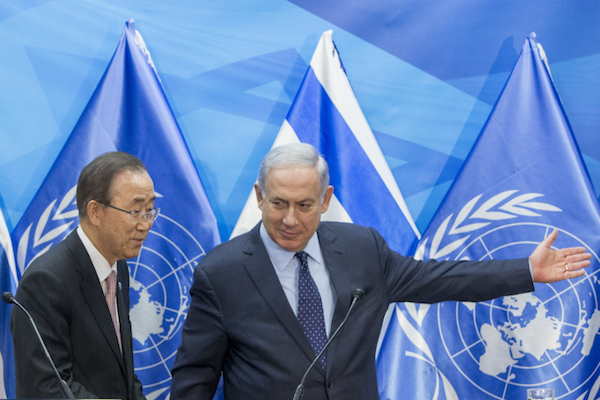Israel’s response to the Quartet’s ‘recommendation’ that it halt settlement expansion makes one thing perfectly clear: Netanyahu has fully internalized that nobody is coming to end the occupation.

The Quartet on Friday released a long-awaited report on … well, actually, nobody is really sure what it is about or why it was written. In fact, it’s not really clear what the Quartet is aside from a grouping of countries and international institutions that once upon a time endorsed a peace plan that never got off the ground (George W. Bush’s Roadmap for Peace).
The Quartet report did not say anything new. It simply repeated the same condemnations we’ve heard for over a decade — condemnations of settlements and settlement construction, violence, incitement to violence, and the need for both sides to take steps to “advance[e] the two-state solution on the ground.”
Equally predictable were the reactions the report drew from Israeli and Palestinian leaders alike. Neither side was particularly thrilled, primarily because the report’s authors, quite understandably, focused on their respective unflattering sides.
Rinse and repeat
So what is the point of spending months crafting a 3,500-word document that regurgitates the same things everyone has been saying for the past decade?
The U.S. State Department offered the following lackluster explanation. “These are legitimate recommendations that we believe are valid and still believe can help – if enacted, if adopted, if pursued – get closer to a two-state solution,” spokesperson John Kirby said.
What were the recommendations? In short: both sides should de-escalate tensions and reduce violence; Israeli should cease settlement activity and permit Palestinian development in the West Bank; Israel should lift its siege on Gaza; and the Palestinians should establish a single government that controls both the West Bank and Gaza.
“That many of those recommendations – most of them – are ones that we have made in the past or we have talked about before – not just us, but other members of the Quartet – I think should come as no surprise to anyone,” Kirby added.
That is a dangerous situation. By repeating the same tired “recommendations” ad nauseum for over a decade, and without laying out any consequences or next steps, the conglomerate of world powers known as the Quartet is broadcasting a depressingly clear message —nobody is coming to end the occupation.
That’s not news, of course. (See my identically titled article from late last year.) But the effect such messages have on the Israeli government is significant and could be seen almost immediately in the intransigent and bull-headed response issued by Prime Minister Benjamin Netanyahu’s bureau.
Settlements? What’s wrong with settlements?

While appearing quite satisfied with the condemnations of Palestinian violence, the prime minister was incensed by the Quartet’s descriptions of Israeli settlements as obstacles to peace and its call to immediately cease settlement activity.
“It is troubling that the Quartet appears to have adopted the position that the presence of Jews living in the West Bank somehow prevents reaching a two-state solution. The presence of nearly 1.8 million Arabs in Israel isn’t a barrier to peace; it is a testament to our pluralism and commitment to equality,” the Israeli Prime Minister’s Office said in a statement Friday.
There are two astounding things about this paragraph. The first is the way that Netanyahu feigns surprise at the fact that the Quartet “appears to have adopted the position” that settlements are an obstacle to peace.
Phase one of the now-14-year-old Roadmap for Peace, the very raison d’être of the Quartet, prominently features a demand that Israel “freeze all settlement activity (including natural growth of settlements).” There is certainly nothing new about it, and definitely surprising about it coming from the Quartet.
With liberty and justice for all

But the truly troubling part is the way Netanyahu tries to draw a parallel between settlers living alongside an occupied population under a military regime, and an ethno-religious minority living within a self-styled democratic state that guarantees equality for all its citizens.
Let’s be clear. There would be nothing wrong with Jews living in the West Bank if they were subject to a local, democratically elected government that is democratically accountable to all of its subjects — Palestinian and Jewish alike. There would be nothing wrong with Jews living in the West Bank if they acquired land through normal, civil procedures open to all legal residents and not by foreign military decree.
There would be nothing wrong with Jews living in the West Bank if there was no occupation, if there were not dual legal systems for Jews and Palestinians, or if the local Palestinian authorities had any jurisdiction over them. There would be no problem with Jews living in the West Bank if they lived there on the basis of a legal status (residency or citizenship) bestowed upon them by a Palestinian government.
But that is not the case. Jews living in the West Bank are not equals to their Palestinian neighbors, they have not been granted any legal status by a Palestinian or local government, they did not take control of the land they live on with the consent of Palestinian authorities, and they are not subject to the same laws and authorities as their Palestinian neighbors.

Palestinian citizens and residents of Israel, on the other hand, hold legal citizenship and residency status bestowed upon them by Israeli authorities. They are subject to the same laws as Jewish Israelis, and with some notable exceptions, have almost all of the same rights. (None of that is meant to downplay the systemic discrimination and discriminatory laws faced by non-Jews in Israel, all of which makes their lives vastly different from their Jewish compatriots.)
If by invoking Israel’s “pluralism and commitment to equality” Netanyahu had been indicating his government’s intention to extend that pluralism and equality to the Palestinians it rules under a military occupation regime in the West Bank, that might have been a welcome step. Especially if one is a proponent of a single, democratic state for Jews and Palestinians.
But Israel is not interested in Palestinians, it is only interested in their land. No Israeli government has ever intended for Jewish settlers in the West Bank, let alone the land on which they live, to be a part of a Palestinian state. Quite the contrary, the point of the settlements is to carve land out of a Palestinian state, or even worse, to prevent one from ever coming into existence.
By feigned outrage at the proposition that “the presence of Jews” is an obstacle to peace, Netanyahu is actually doing something far more sinister. He is suggesting that there is something anti-Semitic about opposing settlements. This is particularly worrying, although not surprising, considering increasingly frequent attempts to equate anti-Semitism with legitimate criticisms of Israeli policy and political ideology (Zionism).
That level of intransigence is an indication that Netanyahu heard the Quartet’s “nobody is coming to end the occupation” message loud and clear.


